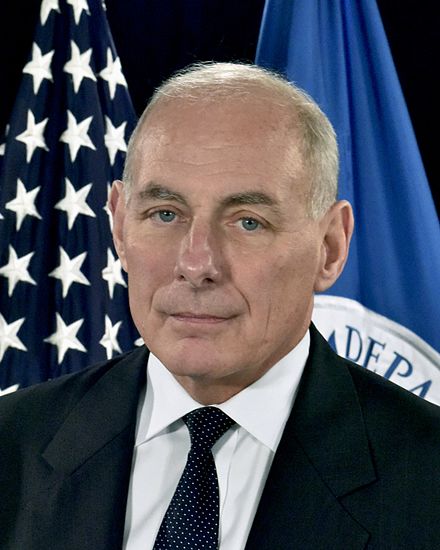
With laws and federal personnel in place, additional resources should be dedicated to the U.S. Department of Homeland Security (DHS) to enforce the nation’s border security challenges, particularly along the southern border, said DHS Secretary John F. Kelly.
“We face diverse challenges and adversaries that do not respect our rule of law or our borders,” Kelly testified on Wednesday before the Senate Homeland Security and Governmental Affairs Committee on improving border security and public safety.
“We confront sophisticated and adaptable adversaries and we are dedicated to maintaining our vigilance as we work to counter these threats to our national security,” said Kelly, named to his post in January to oversee a DHS staff of 230,000.
Kelly, a retired four-star U.S. Marine Corps general, knows the nation’s southern border well as the former commander of the U.S. Southern Command, the Unified Combatant Command responsible for American military operations in Central America, South America and the Caribbean. To justify the request for additional federal funds for southern border security, Kelly highlighted early successes, thus far.
For instance, U.S. Customs and Border Protection reported a decline in apprehensions along the southwest border since the beginning of 2017 with 17,000 in March, marking the fifth straight month of decline and estimated to be approximately 71 percent lower than the December 2016 total of 58,478 apprehensions, Kelly said.
“This decrease in apprehensions is no accident. But while this recent decline in illegal migration is good news, we must ensure that the security of our southern border remains a priority to protect the nation from terrorists and other criminals,” he added.
Build that wall
In March, President Donald Trump submitted a Budget Amendment for Fiscal Year (FY) 2017 that includes $3 billion for border security, immigration enforcement and public safety. Also in March, the Trump administration released its FY 2018 Budget Blueprint that requests $44.1 billion in discretionary budget authority for DHS, a $2.8 billion increase from the FY 2017 annualized continuing resolution level. A comprehensive budget request for FY 2018 will be delivered to Congress in May.
Kelly said the blueprint budget includes $2.6 billion for high-priority border security technology and tactical infrastructure, including funding to plan, design and construct the border wall. Specific details will accompany the release of the complete budget in mid-May, he said, adding: “I plan to use these funds to make sizable investments in: new border barriers; replacing substandard existing fence; constructing or improving hundreds of miles of border roads; and border security technology and equipment in the highest risk areas of operation.”
However, Democratic senators wanted even more details about the forthcoming border wall.
U.S. Sen. Claire McCaskill (D-MO), for example, told Kelly that many senators are not going to approve building a concrete southern border wall “from sea to shining sea” when they don’t really know what they’re getting into financially.
“It’s not going to happen. The Democrats know it. The Republicans know it. I think you know it. It appears that the only person who doesn’t know it is the president of the United States. It’s embarrassing,” McCaskill said. “I urge you to speak truth to power. We’re not going to sign a blank check for a wall that we know isn’t going to get built.”
Kelly said that the parts of the border that have a physical barrier now—roughly 650 miles built years ago—works well in those sectors to deter illegal immigrants and/or the transport of illegal drugs. But, he said, “I have a lot of elbow room” from the president regarding what will eventually be built.
U.S. Sen. John McCain (R-AZ) asked if the to-be-constructed wall might be interpreted as drones, towers, fences, technology to detect tunnels, an electronic wall and personnel, for instance.
“In my view, the wall is all of that,” said Kelly. “I don’t know what it will be made of; I don’t know how high it will be. I don’t know if it’s going to have solar panels on the side and what one side will look like and how it’s going to be painted. I have no idea so I can’t give you any type of an estimate” on cost.
“I will say this: it is unlikely that we will build a wall or physical barrier from sea to shining sea, but it is very likely that I’m committed to putting it where men and women say I should be putting it,” he added.

